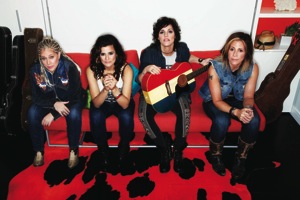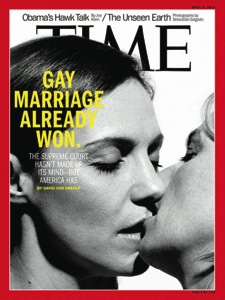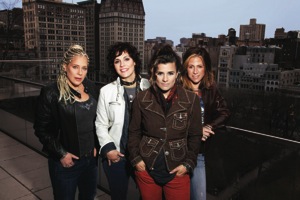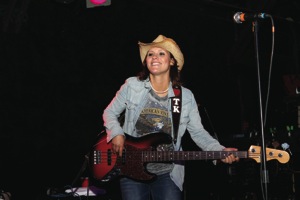
By the end of the 1950s, it had become apparent that the first chapter in rock ’n’ roll’s storied history had come to a close. Buddy Holly, Richie Valens (“La Bamba”) and the Big Bopper (“Chantilly Lace”) were all killed in a plane crash over Iowa. Little Richard (“Good Golly, Miss Molly”) had retired from the industry to become a preacher. Elvis Presley was inducted into the Army while both Chuck Berry (“Johnny B. Goode”) and Jerry Lee Lewis (“Great Balls of Fire”) were either charged or indicted over their sexual involvement with minors. Finally, Allan Freed, the Cleveland-based disc jockey who is credited with first using the term ‘rock ’n’ roll’ on the radio, was embroiled in the Payola scandal (accepting money for playing certain songs) that spelled not only the end of his career but the end of an era.
But between that period and, just a few years later, the British Invasion (The Beatles, The Who, Pink Floyd, Herman and The Hermits and The Animals among others), a window opened just long enough to see the emergence of what was then called the “all-girl groups”; The Shirelles (“Will You Love Me Tomorrow”), The Crystals (“Da Doo Ron Ron”), The Chantels (who actually began recording in 1957) and, of course, Diana Ross and The Supremes. There were other “all-girl groups” before them – The Chordettes (“Mr. Sandman”) and The Andrew Sisters (“Boogie Woogie Bugle Boy of Company B”) – but, like so many other institutions before and since, rarely did any outside of the white male heterosexual get heard with any degree of seriousness. And rock ’n’ roll was no exception.
Then, from the British Invasion until almost 1982, there was a long, dry summer in which women all but figured peripherally in the music industry. There were, of course, solo acts – Debbie Harry, Patti Smith and Joan Jett, to name a few – but it wasn’t until the Go-Go’s emerged in 1982 with their smash single “We Got The Beat” did girl bands begin to re-emerge as serious contenders for the public’s music-loving dollars.
They were followed almost simultaneously by The Bangles (“Walk Like An Egyptian”) who, for most of the 1980s, churned out catchy, melodic hits but who, nonetheless, seemed to represent a softer side to rock ’n’ roll that was less threatening and more accessible than the heavy metal and new wave bands that were, unsurprisingly, still dominated by white, male heterosexuals. Little is remembered now by the casual music lover of the impact that two sisters – Ann and Nancy Wilson, collectively known as the band Heart – had on the industry. Their success blazed trails for future female rockers that can still be heard today and they are deservedly mentioned as one of the top 100 rock ’n’ roll bands of all time.
But if the history of women in rock ’n’ roll, including all its permutations (e.g. glam, psychedelic, punk, garage, country etc.) is a seemingly incomplete one, the story of the role of gay and lesbian musicians is just starting to be written.
Enter Antigone Rising. This self-described alt-country rock band composed of sisters Kristen Ellis-Henderson (bass guitar, vocals) and Cathy Henderson (lead guitar, vocals), Nini Camps (rhythm guitar, vocals) and Dena Tauriello (drums) have established themselves, through their musicianship, hard work and just plain likeability, as a force of musical nature. They have toured with such A-listers as Aerosmith and The Rolling Stones; were appointed as cultural ambassadors by the United States government to tour Israel and the Middle East; are currently in heavy rotation on CMT with their smash hit “That Was The Whiskey,” and – not that it especially matters – all happen to be lesbian.
San Diego LGBT Weekly had a chance to catch up with the band between their mindboggling 280-show-a-year tour to find out more about their music, their fans and their attitudes about a business that is still reliably white, male and heterosexual.
(Ed. Note: Kristen Ellis-Henderson responded to our questions on the band’s behalf.)

San Diego LGBT Weekly: Let’s start with the band’s name: Antigone Rising. If my Greek history serves me correctly, Antigone was the daughter of Oedipus and Jocasta who were blood relatives. Who came up with the name, what is it meant to suggest and who or what is ‘rising’ in Antigone Rising?
Kristen Ellis-Henderson: We came up with the name in college. We took an English tragedy course and liked the fact that Antigone stood up to the king for what she believed was right. She is a legend not a myth, so she is considered to have really existed. And some argue she is the world’s first feminist for standing up for her beliefs. We thought she was a cool role mode so we named our band after her.
You describe yourselves as an “all-female alt-country rock band.” Stylistically, rock and country seem pretty far apart. How do you bridge that gap musically? Also, ‘alt’ has been used for years but seems almost passé now. Are you ‘alt’ because you are all women? Because you are all lesbian? Or am I reading too much into it?
We didn’t come up with the term ‘alt.’ It just seems to be what the drop-down menu on every social media web service offers us. Personally, [we] think country music and rock music are first cousins, often times kissing cousins. Much like our band’s namesake came from incestuous beginnings, so does our genre.
On your Web site, you playfully note: “If the Eagles were prett(ier) and The Allman Brothers had no facial hair, you’d have Antigone Rising, the alt-country all-female boot-stompin’ rockers from New York City. AR’s philosophy is simple– play better than the boys and make sure the fans feel like part of the family. Why do you feel you have to play better? Doesn’t your music stand on its own?
We live in a country where men get paid more money than women to do the same job. If our band gets invited onto a festival bill, you can guarantee we’re the only all-female band for miles. And only maybe will there be one other female fronted or solo act on a bill of 25 male acts. So, yes, we have to play better. And, according to the last MTV Music Awards, where Miley Cyrus catapulted the women’s movement back into the Dark Ages by twerking against Robin Thicke – and believing she did it because she owns herself – women still have something to prove in 2014. Go Hillary.
Tell us about Whiskey & Wine, Volume 1 & 2. Why did you decide to release two EPs this year?
The thinking behind releasing two EPs in one year as opposed to one full-length CD is primarily from a business mindset. By spacing out the release of our music, it helps create a constant stream of content. The Internet has made this necessary. And, quite frankly, we’re having fun doing things this way.

Many of the interviews I read in the gay media refer back to the April, 2013 Time magazine cover – “Gay Marriage Already Won” – which is understandable. But on a more practical level, did it help you sell more records? Book more shows?
My wife (Sarah Ellis-Henderson, who was recently appointed president and CEO of GLAAD) definitely didn’t kiss me on the cover of Time magazine for the band to sell more records or book more shows. We did it because visibility is what changes the game for the LGBT community in our country.
Country music fans, fairly or not, have been stereotyped as homophobic, right-wing Christians with little tolerance for sexual minorities. After all, no major country music star is out (although many now support the LGBT community). Have you had to deal with any homophobia in your careers? Has, for example, a club ever told you they wouldn’t book a bunch of lesbians?
No club has ever told us they can’t book a bunch of lesbians. But there are some people who don’t return our calls or emails. I don’t know if that makes them homophobic or they just didn’t like our music. Maybe a little of each or a little of both or they just didn’t get our emails. Plenty of clubs and people do return our calls and emails and do like our music and we choose to focus on that.
Do you feel any special obligation when composing your music to consider your LGBT audience or do you just let the music speak for itself?
We let the music speak for itself. I think, most importantly, we’re humans and we struggle. And I haven’t met too many people who can’t relate to that.
What are your groupies like?
This makes me giggle. Our groupies are really nice people who travel all over the country to see us play. Honestly, they become our friends and family on the road. Groupies are the best thing about being in our band.

Who are some of the most important influences for you, musically speaking?
Right now I think my kids are my biggest inspiration. I write songs with them in mind every time now. As far as other artists that inspire me, right this second my friends who work really hard and write amazing songs like Stephen Kellogg and Lori McKenna, Mary Gauthier and Kristen Hall. They inspire me.
There’s a young girl in a small town in Kentucky who listens to your music and who struggles daily with her sexuality. She’s picked on at school, her family condemns her and she has no big-city resources to turn to. What would you like to tell her?
Honestly, tell her to get in touch with me. I want to talk to her and let her know she’s going to be OK and that there are places she can go where she will be safe. I’m a mom now first and moms don’t like hearing about kids getting picked on or rejected. At least not this mom.
For more information, tour dates, music samples and other savory morsels, be sure to check out Antigone Rising at their Web site: www.antigonerising.com











